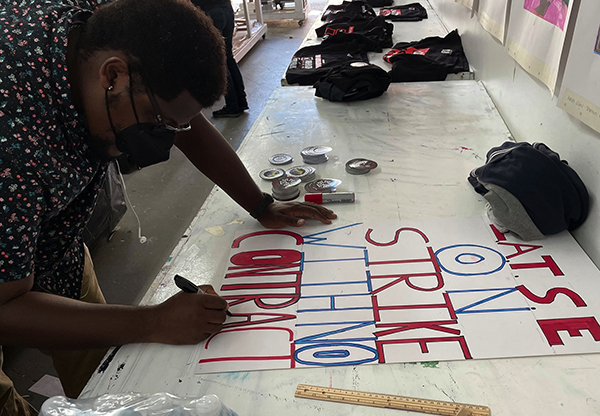Wave wire Services
HOLLYWOOD — Production of television shows and movies will continue after the International Alliance of Theatrical Stage Employees and Hollywood’s major studios and leaders reached a tentative agreement Oct. 16, averting a strike that threatened to shut down productions.
The crews’ union, which represents about 40,000 members from 13 Hollywood locals, must still approve the deal that includes 3% annual wage hikes, improvements in pay and conditions on streaming productions, observance of the Martin Luther King Jr. holiday, and a rest period of 10 hours between daily shoots and 54 hours on weekends.
Union solidarity and a rare display of muscle from the industry’s “below the line” production crews are being credited for a three-year deal between the IATSE and the Alliance of Motion Picture and Television Producers, averting a strike that was set for one minute after midnight Oct. 18, which would have shut down film and TV production.
“This is a Hollywood ending,” IATSE International President Matthew Loeb said in a statement. “Our members stood firm. They’re tough and united. … Solidarity is more than a word; it’s the way to get things done.”
The basic and videotape agreements address core issues, including reasonable rest periods, meal breaks, a living wage for those on the bottom of the pay scale and significant increases in compensation to be paid by new-media companies.
“This agreement, and the contract campaign before it, should serve as a model for other workers in the entertainment and tech industries, for workers employed by gaming companies and for so-called ‘gig workers.’ … We’re the original gig workers,” Loeb said.
“Like non-union, freelance workers, many of our highly skilled members go to work at different times, for different employers, at different locations,” Loeb said. “The difference is, our people have health care and retirement benefits, can negotiate for better wages and conditions and have a voice and power because they work together through their union.”
Variety reported that many members of IATSE say they will vote against ratifying the new deal with studios because it falls short of addressing working conditions on set.
“Basically nothing has changed,” Ernesto Lomeli, a director of photography based in Los Angeles, told Variety. “I have not heard a single person saying they will vote yes.”
President of the Art Directors Guild IATSE Local 800 Nelson Coates told his members that it was a strong contract, the Los Angeles Times reported. “The employers moved on issues some thought would never be addressed,” Coates told the Times. “Several senior members of the bargaining committee have been fighting for improved turnaround and weekend rest for nearly three decades.”
The contract must still be ratified by union members, but it appears the first nationwide strike since the founding of the union — 128 years ago — has been called off. The contract affects some 40,000 film and television workers represented by 13 West Coast IATSE local unions, including camera operators, production and department coordinators, writers’ assistants, cinematographers, costumers, grips, sound technicians and makeup artists, among others. They were briefed by local leaders on full details and language of the tentative agreement earlier this week.
However, negotiations remain ongoing for workers under the similar area standards agreement, and belong to IATSE local unions in major production hubs such as New Mexico, New York, Illinois, Georgia and Louisiana.
“Our members will see significant improvements, but our employers also will benefit,” said Mike Miller, vice president for IATSE. “This settlement allows pre-production, production and post-production to continue without interruption. Workers should have improved morale and be more alert. Health and safety standards have been upgraded.”
AFL-CIO President Liz Shuler said to the National Press Club Oct. 13 that IATSE members were “fighting for the weekend.”
Shortly after the deal was announced, congratulations were offered by a union of actors.
“SAG-AFTRA congratulates the members of the International Alliance of Theatrical Stage Employees for reaching a tentative contract agreement with the Alliance of Motion Picture and Television Producers,” the union said in a statement.
“We are pleased and relieved that the two sides were able to reach an agreement and that a strike was averted, but there was always more at stake here than an industry shutdown,” said SAG-AFTRA National Executive Director Duncan Crabtree-Ireland. “All workers deserve safe working conditions and fair wages, and this outcome once again demonstrates the power of unity. We are proud of what our fellow union members have achieved.”
Loeb described IATSE union members as “the workhorses of the television and film industry,” and said they were prepared to withhold their labor and go on strike until issues related to the quality of their lives were addressed. “We went toe to toe with some of the richest and most powerful entertainment and tech companies in the world, and we have now reached an agreement with the AMPTP that meets our members’ needs.”
The AMPTP is a trade association representing employers and producers of television and film, and includes Walt Disney Studios, Warner Bros., Paramount Pictures, Apple, Netflix and Amazon, among others.
IATSE announced that it had near-unanimous support from its own members, but also received widespread support from actors, directors and other members of the entertainment community. In addition, 120 members of Congress signed on to a letter, and state government leaders in California, New York and other production centers also chimed in. The union also received AFL-CIO support and that of the broader labor movement.
The union set the strike deadline Oct. 13, putting pressure on producers to get a deal done and avoid a mass production shutdown that could cripple an entertainment industry already struggling to recover from the COVID-19 pandemic. The pandemic also played a role in toughening the union’s stance.
“During COVID everyone got a chance to take time off and we realized ‘Wow’ this is what we’ve been missing,” lighting director and member of IATSE Local 728 Joe Holdman told the Times. “We got a new perspective and a taste of what life could be like.”
The members voted Oct. 1-3 to authorize Loeb to call a strike if talks didn’t result in a new deal. Voter turnout was 90%, with 98.6% of those voting in support of authorizing a strike.
Studio executives apparently got rattled in late September when IATSE members returned a vote of nearly 99% in support of a strike. Councilman Mitch O’Farrell and Councilwoman Nithya Raman, whose districts include parts of Hollywood, said they stood behind the union members.
The contract between IATSE and AMPTP expired at the end of July, although it had been extended to Sept. 10.











